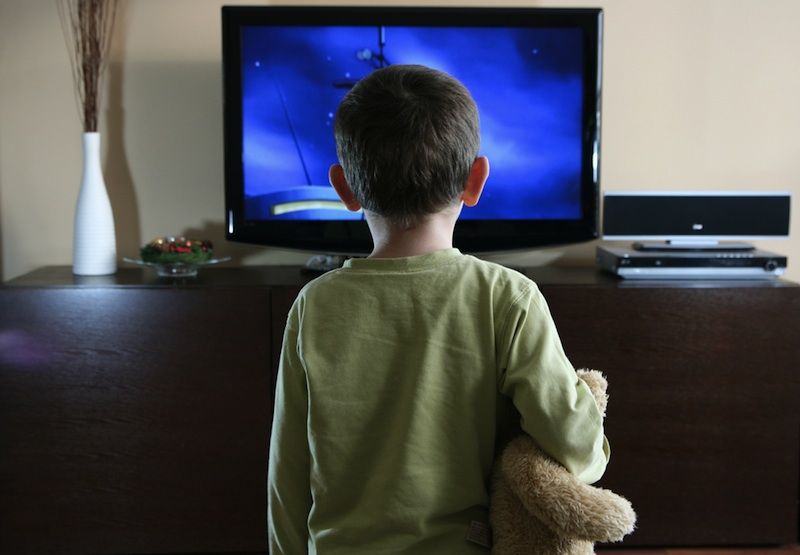'SpongeBob' Cartoon Can Cloud Kids' Concentration

Mom and Dad warned that television would rot your brain, and a new study suggests it's true — at least from certain frenetic-style cartoons.
Kids who watched just nine minutes of the fast-paced children's cartoon "SpongeBob SquarePants" did worse afterward at tasks requiring focus and self-control than did kids who watched a slow-paced cartoon and kids who entertained themselves by coloring.
The study was small, and scientists weren't sure how long the brain-drain effect persists. But the research highlights the importance not just of how much TV a child watches, but of what kind, said Dimitri Christakis of the Seattle Children's Research Institute at the University of Washington. Christakis was not involved in the study, but penned an accompanying editorial appearing today (Sept. 12) in the journal Pediatrics.
"It's not … all television that creates deficits in attention," Christakis told LiveScience. "It's the pacing of the program, what we call the 'formal features,' that actually matter."
Kids and cartoons
Earlier observation studies returned mixed results on the effect of television on child development, but there have been enough red flags to concern researchers. For example, in a study published in 2009 in the Archives of Pediatrics & Adolescent Medicine, Christakis found that television time decreases the verbal back-and-forth between parents and young kids, potentially stifling children's language and social development. [11 Facts Parents Should Know About Their Baby's Brain]
The new study, led by University of Virginia psychologist Angeline Lillard, sought to find out whether the type of TV that children watch makes a difference. The researchers recruited 60 4-year-olds (via their parents) and assigned them to one of three conditions. In the first, the children simply colored for nine minutes. In the second, they watched nine minutes of "a very popular fantastical cartoon about an animated sponge that lives under the sea." The third group of children watched nine minutes of "a realistic Public Broadcasting Service cartoon about a typical U.S. preschool-age boy."
Sign up for the Live Science daily newsletter now
Get the world’s most fascinating discoveries delivered straight to your inbox.
Lillard was not available for an interview to confirm the shows used, but the descriptions match the cartoon "SpongeBob SquarePants" and the PBS show "Caillou."
The shows were chosen for their very different pacing. "SpongeBob" underwent a complete scene change every 11 seconds, with lots of frenetic movement in between, the researchers reported. The PBS show was slower, with a scene change every 34 seconds or so.
Children's shows have become faster-paced over the years even as children watch more television, Christakis said. In the 1970s, children started watching TV at age 4. Today the average age for beginning to watch television is 4 months. The Kaiser Family Foundation estimates that two-thirds of infants and toddlers spend an average of two hours a day watching TV or another screen. The concern is that overstimulation from hyperactive shows will tax the brain, leading to trouble focusing later.
Testing self-control
After the kids finished watching television or coloring, the researchers had them complete a variety of tasks to measure executive control, or the mental ability to focus, avoid distraction and control oneself. Kids did a directions-following test involving moving disks from one peg to another, played a "Simon Says"-like game in which they were asked to touch their head, toes or other parts, and practiced repeating sequences of numbers backwards.
The researchers also gave the kids the famed "marshmallow test," a common challenge for children's self-control. The researchers put out either marshmallows or Goldfish crackers (depending on which the child preferred) and left the room. Before they left, they told the kids that they could ring a bell and eat two marshmallows or crackers immediately. But if they waited instead for the experimenters got back, they could have 10 marshmallows or crackers.
This test of willpower has been shown to predict how much self-control kids will have as adults. That's important, because self-control and delaying gratification are considered keys to everything from maintaining good health to building a successful career.
The effect of the boob tube
The researchers tallied and placed the kids' scores on a standardized scale to compare how well each group did. They found that "SpongeBob" watchers scored consistently more poorly across the board. For example, the average standardized score for a child who watched the PBS program on the marshmallow test was around 0.2. For a child who'd watched the frenetic cartoon, it was close to minus 0.5.
Kids who watched the slow-paced cartoon performed on the same level as kids who spent their time coloring, indicating that it wasn't the act of TV watching that was causing the deficit, but the type of TV being watched.
"It would be wrong for people to overgeneralize this and say 'SpongeBob' is a bad show and 'Caillou' is a good show," Christakis said. "It's not about the specific shows. It's about the features of those shows."
A show like "Sesame Street" is more naturally paced, according to Christakis. Theoretically, that would mean that "Sesame Street" isn't so likely to tax kids' brains, but that theory hasn't been tested. A 1977 study published in the journal Educational Technology Research and Development compared the cognitive effects of fast-paced versus slow-paced "Sesame Street" episodes and found no difference between the two. But a 2004 study in the journal Perceptual & Motor Skills noted that "Sesame Street" itself has picked up the pace since the 1970s, and no one has studied modern episodes.
The researchers aren't yet sure how long the struggles with executive function persist or how children younger and older than in this study sample are affected, but Christakis said observational research suggests that long-term media exposure can have long-term impacts. More and larger studies are needed to answer those questions, he said, but the current research should strike a cautionary chord for parents.
"At minimum, I think parents should take home from this study that I would not encourage them to watch 'SpongeBob' just before their kindergarten assessments," Christakis said.
You can follow LiveScience senior writer Stephanie Pappas on Twitter @sipappas. Follow LiveScience for the latest in science news and discoveries on Twitter @livescience and on Facebook.

Stephanie Pappas is a contributing writer for Live Science, covering topics ranging from geoscience to archaeology to the human brain and behavior. She was previously a senior writer for Live Science but is now a freelancer based in Denver, Colorado, and regularly contributes to Scientific American and The Monitor, the monthly magazine of the American Psychological Association. Stephanie received a bachelor's degree in psychology from the University of South Carolina and a graduate certificate in science communication from the University of California, Santa Cruz.
Most Popular




